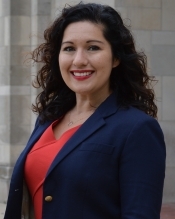ASU criminology, public affairs schools collaborate to serve community

Photo by Mohamed Hassan/Pixabay
You can’t study crime without thinking about the broader community. That’s according to Arizona State University Professor Shannon Portillo, and she’s not alone in her belief.
To that end, ASU's School of Public Affairs (SPA), where Portillo serves as director, and School of Criminology and Criminal Justice (SCCJ) are collaborating in new ways toward continued superior achievement in research, teaching and service to their communities, as expressed in the ASU Charter.
Their efforts include undertaking an Arizona Board of Regents-funded study exploring the challenges to recruit and retain Arizona detention officers and the separate hiring of the schools’ first-ever joint faculty member. They’re also creating opportunities for students from both schools to closely work together.
“We are talking about public organizations and public policies, and a lot of work in SCCJ is inclusive of that,” said Portillo, who noted that ASU is in an uncommon position, with a strong academic presenceIn April, U.S. News ranked seven graduate specialty areas in SPA in the national top 10, with the school itself ranked No. 13 overall. And in February, U.S. News ranked the SCCJ online graduate program in the national top 15 for the 10th consecutive year. in both criminology and public affairs.
“It all ties back to the ASU Charter, which focuses on public value to our communities. Both our schools are really invested in that. We recognize that we’re doing it right.”
SCCJ Director and Professor Beth Huebner agreed, saying that partnerships such as this one are an integral part of the Watts College of Public Service and Community Solutions.
In April, the Arizona Board of Regents approved spending $359,000 from their Technology and Research Initiative Fund (TRIF) through a Regents Community Grant to support researchers from SCCJ, SPA, ASU’s Morrison Institute of Public Policy and the University of Arizona.
Over 14 months, the researchers will analyze data, survey current detention employees and interview county sheriffs and other detention facility officials, human resources directors and community leaders about the challenges to recruit and retain detention officers, according to the research proposal.
The ASU team will include Huebner, Portillo, SCCJ faculty members Joseph Schafer and Cody Telep and graduate students from SCCJ and SPA.
According to a joint statement to the regents from the Arizona County Supervisors Association and the Arizona Sheriffs Association, detention services are “an essential part of the criminal justice system and must operate effectively without fail. Proper staffing levels of detention facilities as well as minimizing staff load are essential to protecting the safety of detention personnel and inmates.”
The supervisors and sheriffs said that solutions that “attract, motivate and incentivize qualified people to pursue careers in county detention (are) vital to public safety in Arizona.”
The project follows a similar study the regents funded through TRIF in 2023. The two schools and the Morrison Institute, along with researchers from the University of Arizona and Northern Arizona University, collaborated to produce part of a series of research reports from Arizona’s three public universities.
The universities recommended a variety of innovative strategies intended to boost retention and recruitment for Arizona’s public safety workforce.
Suggested approaches included changing police officers’ and firefighters’ pay schedules to include early-career bonuses, using social media to provide a glimpse of what a public safety career is really like and offering stipends to offset housing costs.
New professor is first joint hire
The appointment of James E. Wright II of Florida State University to the faculty of both schools is another outgrowth of the collaboration. Wright begins work in August.
Wright’s academic interests include public management, public administration, public policy, criminal justice and social justice. He serves as co-director of Florida State’s Social Justice and Innovation Lab.
Portillo said Wright will be a welcome addition to the faculty as he will span both the criminology and criminal justice and public affairs fields. Huebner said he will contribute additional depth to the college’s already established excellence in the areas of policing and social change.
SCCJ, SPA and the Morrison Institute are part of the Watts College of Public Service and Community Solutions.
More University news

ASU on the cusp of becoming a $1B research university
Once a fledgling research school, Arizona State University soon will hit $1 billion in annual research funding, placing the university into a rare category reached by just 33 universities across the…
ASU tops $900 million in research expenditures
For the past decade, Arizona State University has been climbing the ranks as one of fastest-growing research universities in the world. One key measuring stick is the National Science Foundation’s…

ASU names 3 Regents Professors for 2025
Three Arizona State University professors are being honored with the highest faculty award possible — Regents Professor.The three are internationally recognized experts at the top of their fields,…

